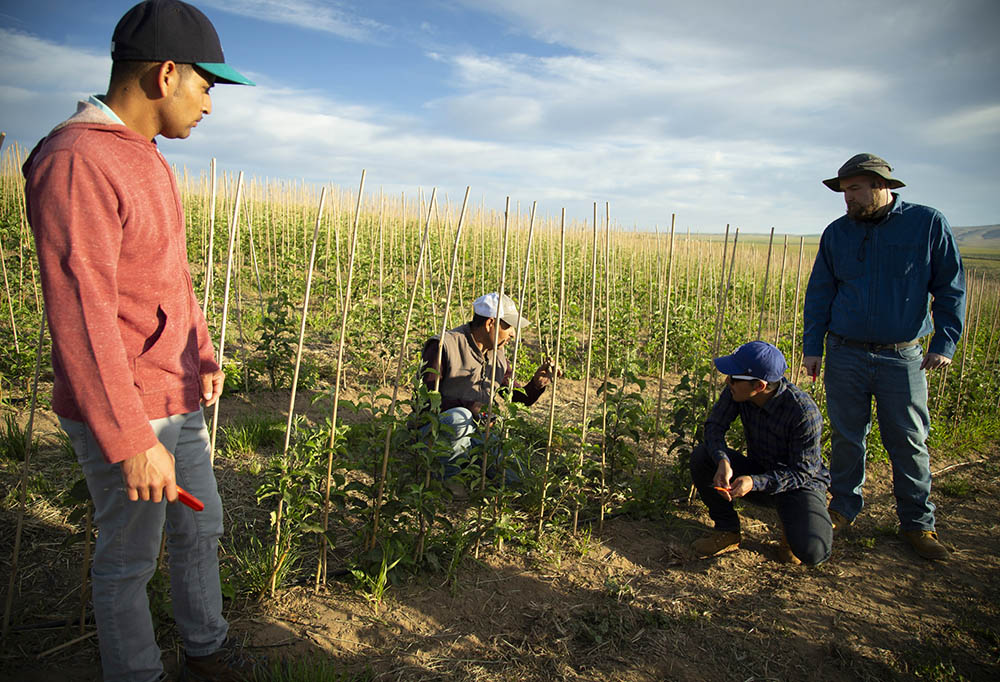
A migrant worker teaches seminarians how to prune young apple trees at an orchard in Prosser, Washington, May 29, 2018, as the seminarians began their first day in a migrant ministry program. All seminarians from the Yakima Diocese are required to work in the agricultural fields with migrant laborers as part of their formation. (CNS/Chaz Muth)
When his alarm buzzes at 3 a.m., Daniel Sanchez prepares for a day in the fields alongside migrants who pick cherries and apples in Yakima, Washington, a central valley community known as the nation's fruit basket. The 25-year-old isn't one of the thousands of mostly Mexican workers who labor under an unforgiving sun that earlier this summer scorched this region with temperatures rising above 100 degrees.
Sanchez is a seminarian in the Yakima Diocese, where all men studying to be priests are not only expected to study theology, philosophy and biblical exegesis, but also spend part of their summer learning from and ministering to migrants. Sanchez has done work as varied as pruning grape vines, sorting cherries and helping the migrants' children learn to read English.
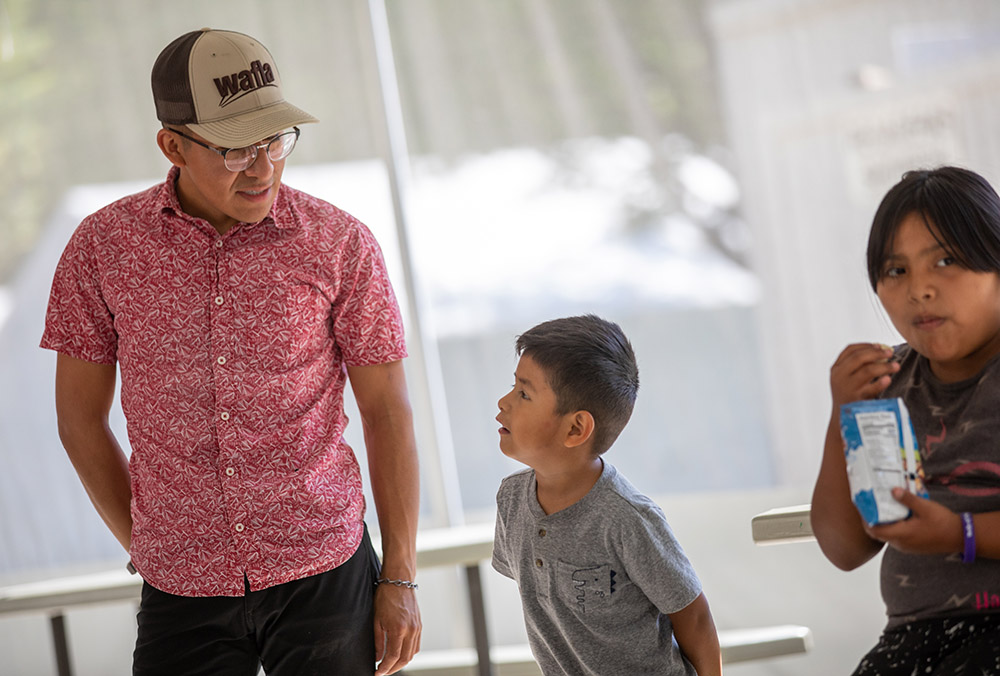
Daniel Sanchez, a seminarian with the Diocese of Yakima, Washington, checks in with the children during a visit from the Literacy Wagon July 29. The program, funded by Catholic Extension, deepens the reading skills of hundreds of migrant children whose parents are working in the fields. It is led and organized by seminarians from the diocese as part of their outreach to migrant workers. (Courtesy of Catholic Extension)
"It has been a humbling experience that helps me realize my vocation isn't about me, but the people I'm ministering to," said Sanchez, who was born in Washington state after his parents immigrated from Oaxaca, Mexico. "The beauty of this ministry is it helps the migrant workers see that the church has not abandoned them. The church is there when they are lonely or tired, and goes out to meet them where they are."
A bishop in the fields
Yakima's unique experiential priestly formation started in the summer of 2012, a year before Pope Francis was elected and called for pastors and bishops to have "the smell of the sheep," and for the church to be a "field hospital" that accompanies people on the margins. But this is the first summer that seminarians were also expected to spend time living in the same residence with the workers, a former hotel that serves as a temporary home for migrants.
Bishop Joseph Tyson not only came up with the idea for housing seminarians with migrants, but also walked the walk himself by living there for nearly a month. During one stretch over the summer, extreme heat and fires were so intense the diocese almost had to shut down the ministry.
Since the program started, the Spanish-speaking bishop has been in the fields alongside seminarians and migrants, offering Mass, giving first Communion and confirming workers, listening to their stories of struggle and hope. He believes the migrants teach the seminarians just as much as the seminarians help the workers.
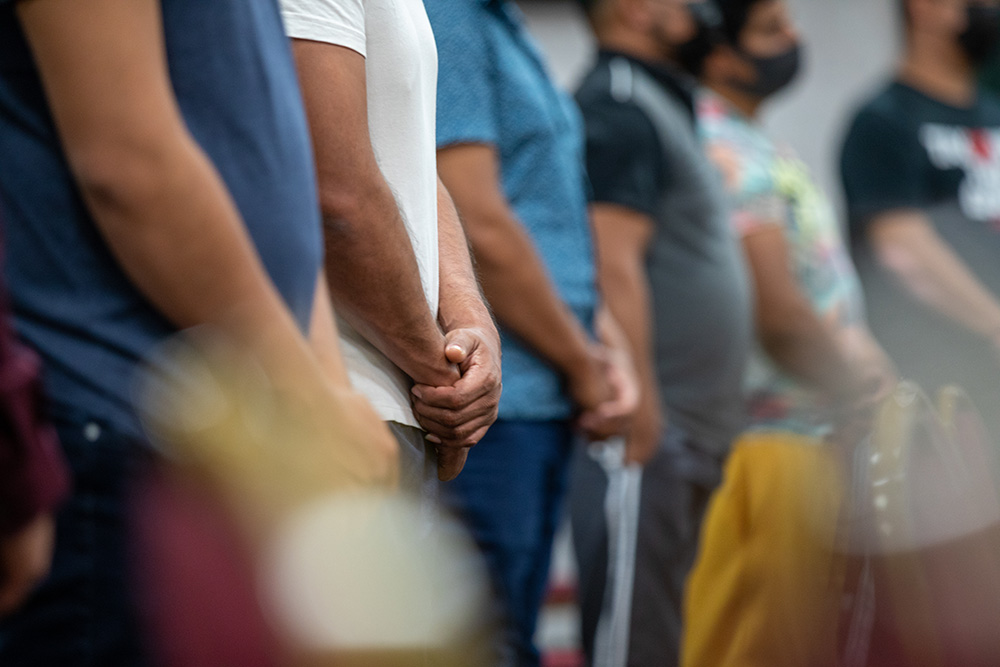
A group of farmworkers attend evening Mass celebrated by Bishop Joseph Tyson July 28 at the Fairbridge Hotel in Yakima, Washington, where they live during cherry-picking season. (Courtesy of Catholic Extension)
'These people in the fields are our parishioners as much as anyone else.'
—Bishop Joseph Tyson
"You really see a side of a man's character you wouldn't otherwise see when they are out there picking fruit and rubbing elbows with people who are very resilient," Tyson said. "This is hot, hard work. I think the seminarians build resilience by being around that kind of resilience. If you want to elevate the bread and wine, the fruit of the vine and work of human hands, I want our priests to feel that weight in their bones. The sacrifice of the Mass involves real human labor. I want them to see what it takes to get that on the table."
"We need the church to be close with those doing this labor," the bishop added. "We need to be involved in their lives. These people in the fields are our parishioners as much as anyone else."
There are about 189,000 Catholics in the Yakima Diocese but during peak migrant seasons, the bishop said, that number swells by another 65,000 with an influx of migrants, most of whom are Catholic.
The majority of migrants are from Mexico and work legally as part of the H-2A visa program for temporary agricultural workers. They arrive in June for the cherry-picking season. Some head home after the season while others stay to pick apples or pears.
A smaller portion of migrants come from California, most of whom are undocumented.
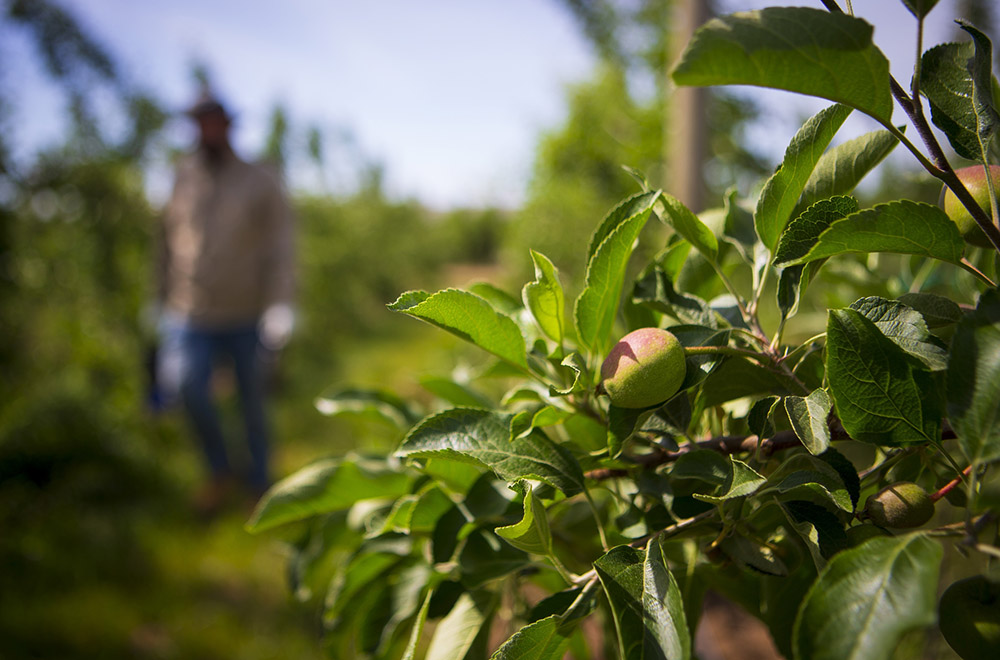
A seminarian walks through a row of young apple trees May 30, 2018, in a field in Prosser, Washington. (CNS/Chaz Muth)
During harvest seasons, most migrants live in 16 temporary camps spread across the 18,000-square-mile diocese.
Before the pandemic, the diocese staffed more than a dozen worship sites in the fields, offering the Eucharist to migrants, providing meals and games for children. COVID-19 has reduced that capacity, and this summer the seminarians have had to scale back some of their close proximity to migrants in the fields. But they are still ministering to the workers, running literacy programs, religious education and other activities for the migrants' children.
A shift in thinking about church
The idea for a migrant ministry began to develop in 2011 after Tyson asked the vicar for clergy in his diocese to identify the biggest challenge in vocations. The response was a "sense of entitlement" among some seminarians who seemed more attuned to their own clerical status and institutional privileges than pastoral care.
"We wanted a more robust real-life experience for seminarians," the bishop said. "In the church of the past you had people coming to Mass out of habit. The church of the future is people don't come to us, we go to them. We're really creating mobile parishes for people on the move. That's a missionary church."
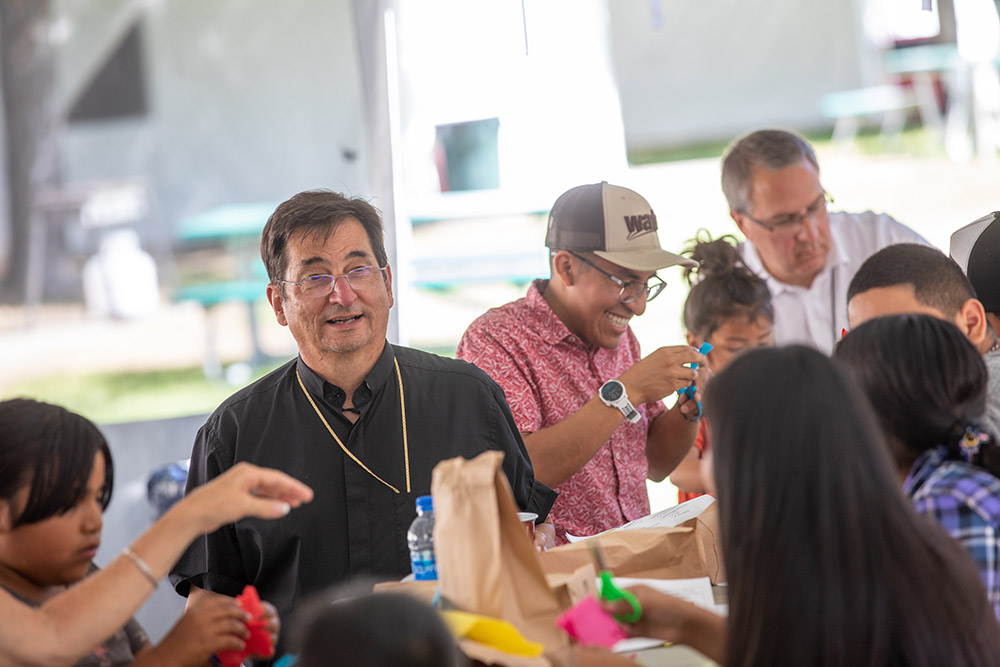
Bishop Joseph Tyson (left) of Yakima, Washington, leads migrant children in crafts July 29 as part of the Literacy Wagon program for migrant children whose parents are working in the fields. (Courtesy of Catholic Extension)
This requires a shift in thinking, he noted, from an old paradigm of maintaining church buildings and structures to a more bottom-up approach.
"My hope is the skill set the seminarians learn in the fields will be replicated inside the parish structure and renew those parish structures," Tyson said. "Parishes can be very self-referential and turn inward. It's not about trying to convince people to come to a building or a program. This is about flipping our understanding and going out into the world."
Fr. Jesús Mariscal occasionally worked on farms in the central Mexican state of Zacatecas before coming to the United States when he was 12. But the Yakima priest, who was ordained three years ago and now serves as the parochial vicar at St. Paul Cathedral, says the time he spent in the fields as a seminarian gave him a deeper appreciation for the migrant experience.
"I picked cherries when I was young but it was to help pay for books or shoes or to help cover some bills; it wasn't for survival." Mariscal said. "They are doing it to survive and you see how hard they work."
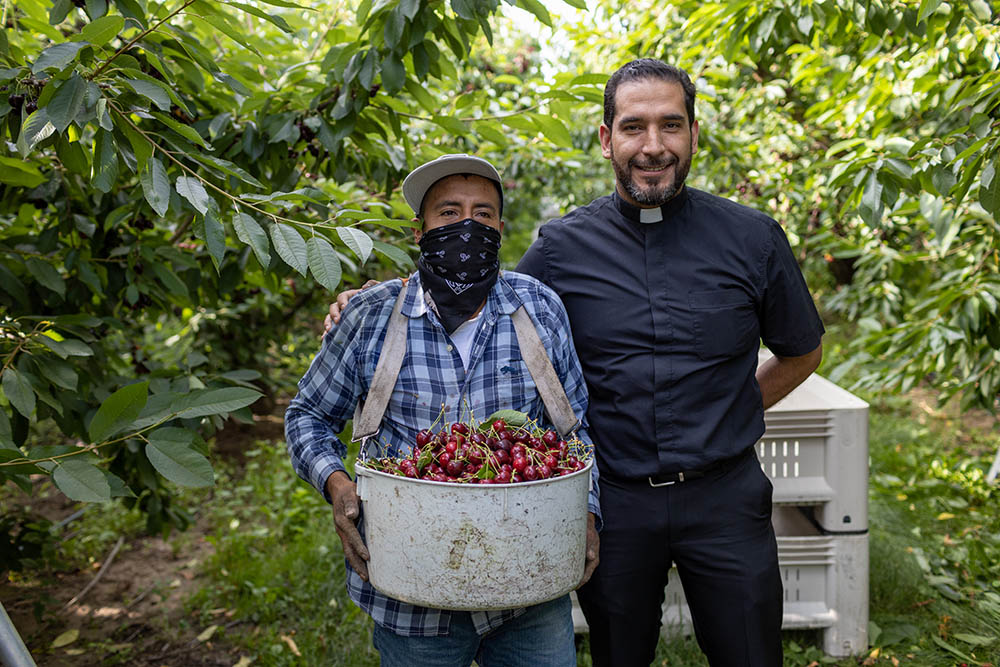
Fr. Jésus Mariscal, migrant ministry supervisor for the Diocese of Yakima, Washington, poses with one of the farmworkers in his ministry, along with his freshly picked crop on July 28. (Courtesy of Catholic Extension)
Mariscal remains active with the migrant ministry and lived in the same residence with the workers, Tyson and other seminarians this summer. "It's a unique and good formation," he said.
"I tell the migrants we're here to accompany you and learn from you," Mariscal said. "They are grateful. I remember one migrant started crying he was so emotional. In Mexico, there is a very clerical culture and they are not used to seeing this. Sometimes when they see Bishop Tyson out there with us they say, 'What have you done? Have you made your bishop mad?' "
'Formative for both the visitors and the visited'
In late July, Catholic Extension, a Chicago-based organization that provides funding and resources to poor and remote mission dioceses, organized a three-day immersion trip for seven priests and lay Catholic ministers from across the country. Participants came to Yakima from Atlanta; Brooklyn, New York; Milwaukee; Barrington, Illinois; Seattle; and Carrollton, Georgia.
Catholic Extension has helped fund the diocese's migrant ministry from the beginning. Joe Boland, vice president of mission for Catholic Extension, says a "theology of encounter" guides all of the organization's immersion trips.
"Rather than offering a superficial poverty tourism, we seek to create substantive mission immersion experiences that are beneficial and formative for both the visitors and the visited, and promote theological reflection," Boland said.
'The church of the future is people don't come to us, we go to them. We're really creating mobile parishes for people on the move. That's a missionary church.'
—Bishop Joseph Tyson
A 2018 grant from the Lilly Endowment's "Thriving in Ministry" program has allowed the organization to expand its immersion trips for 250 pastors. Last week, Catholic Extension took priests and pastoral leaders from Milwaukee, Cleveland, Chicago and Los Angeles to El Paso, Texas, where they spent time visiting a center for unaccompanied minors and migrants, met with Bishop Mark Seitz, and crossed into Juárez, Mexico.
The grittier reality of pastoral care
Brooklyn is a long way, geographically and culturally, from Yakima. Fr. Charles Keeney, diocesan director for the Brooklyn Diocese's Propagation of the Faith office, spent years ministering to Latino immigrants in New York, at St. Leo's Parish in Corona, Queens, and for more than a decade has supported a prison ministry program with Catholic sisters in Tanzania.
But spending time with Mexican migrants working in the fields during his first visit to Washington state was "a very moving experience," the priest said.
Advertisement
During a Wednesday night Mass, he watched Tyson give first Communion to two young people and confirm two migrants. Keeney's Spanish was put to good use interacting with workers picking cherries and helping out during literacy programs for the migrants' children.
During a visit to a 170-acre farm, Keeney even did some quick math and calculated the workers pick a total of about 14 million cherries a day.
In his view, many seminarians and young priests today are more enamored by the trappings of liturgical vestments and a nostalgia for traditional aspects of Catholicism than in the grittier reality of pastoral care.
"This bishop in Yakima is down with the people and he draws seminarians who are more interested in people than with the cult," Keeney said. "A lot of young guys who want to be priests today are into titles and old-time liturgies and Latin. These guys are interested in picking cherries."
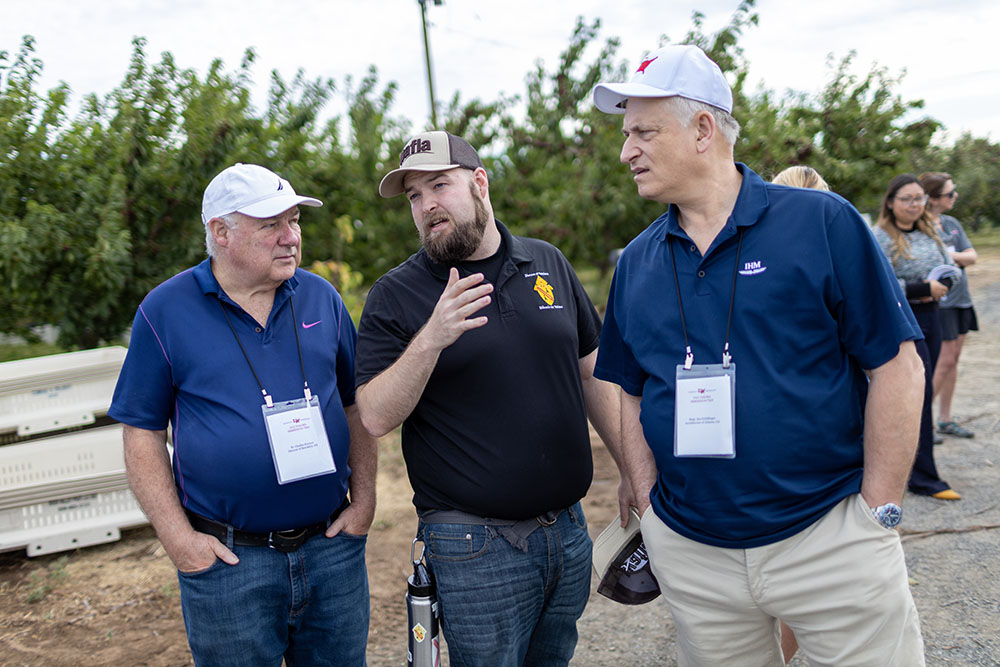
Seminarian John Washington, center, of the Yakima Diocese speaks with immersion participants Fr. Charles Keeney, left, of the Diocese of Brooklyn, New York, and Msgr. Jim Schillinger of the Atlanta Archdiocese, as they prepare to visit the workers in the fields. (Courtesy of Catholic Extension)
The priest can't help but think back to his own seminary days in Huntington, New York, in the 1970s, when migrant farmworkers were housed with his classmates. "During the day, they would be out protesting at the supermarket," he said. "They were organized by Cesar Chavez's group. "But we really didn't interact with them. We were in our world, and they were in their world, even though we lived in the same building."
Ongoing formation of priests
Franciscan Sr. Katarina Schuth, who has studied seminaries for several decades, said that Keeney's experience was more characteristic of an era when men in formation were not exposed to consistent pastoral opportunities outside the classroom. Today, almost every seminarian has some type of practical immersion in a school, hospital, prison or social service setting.
"These direct experiences are really important because they come back to the classroom better able to absorb what you're trying to get across, and they also get a sense of the complexity and diversity of life," said Schuth, an emerita professor at the St. Paul Seminary School of Divinity at the University of St. Thomas in St. Paul, Minnesota.
Nationally, about half of seminarians leave before they become priests, she said, and there are times when a field experience clarifies "how complex the role of being a priest is these days," which is the impetus for some men to leave. "It's important to observe seminarians in direct experience because they can be one way in the classroom and totally different in the field."
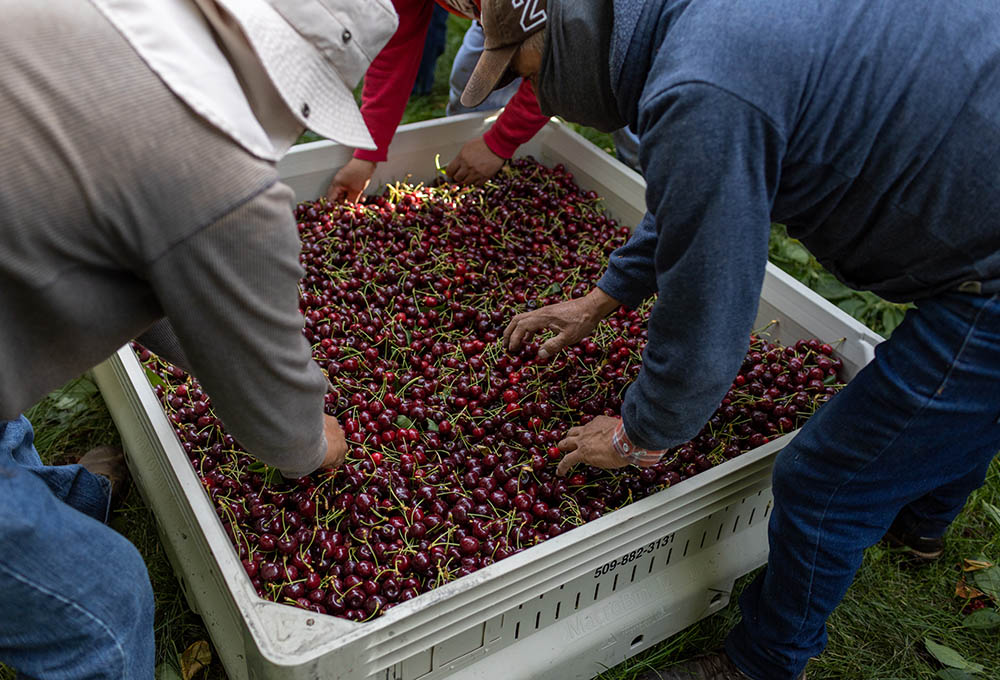
Farmworkers harvest and inspect cherries in Yakima, Washington, July 28. (Courtesy of Catholic Extension)
Msgr. James Schillinger, coordinator for ongoing formation of priests in the Atlanta Archdiocese, traveled to Yakima for the immersion experience in part to bring back his experiences to his own diocese and encourage clergy to seek out opportunities for pastoral growth.
"Everyone knows about seminary formation, but people talk a lot less about ongoing formation of priests," he said. "Once someone is ordained the formation doesn't just stop. The intellectual, spiritual and pastoral formation still has to be developed. The transition from seminary to the priesthood is much harder than they think. Seminarians come in all excited but it's a challenging process."
Schillinger's few days talking to migrants picking cherries in Yakima — learning firsthand about the labor and difficulties of being away from family in Mexico — reminded him that encounter and accompaniment are the essence of ministry.
"I want to educate our priests about the important work Catholic Extension is doing with these trips and encourage them to become involved," Schillinger said. "This is what Pope Francis is talking about and it's the kind of work he wants us to be doing. It's walking with the poor and doing your best to be there for them."
[John Gehring is Catholic program director at Faith in Public Life and author of The Francis Effect: A Radical Pope's Challenge to the American Catholic Church.]




